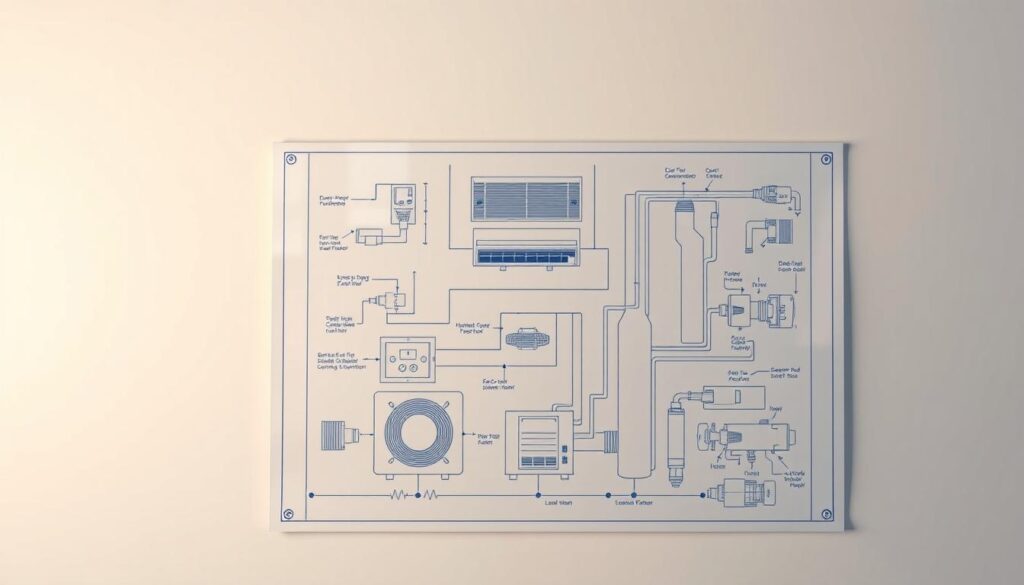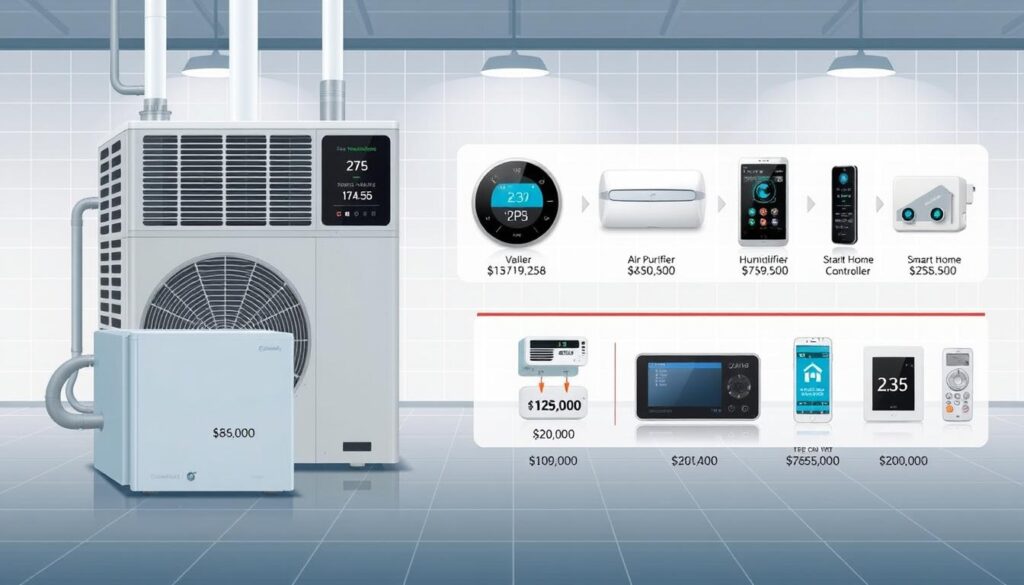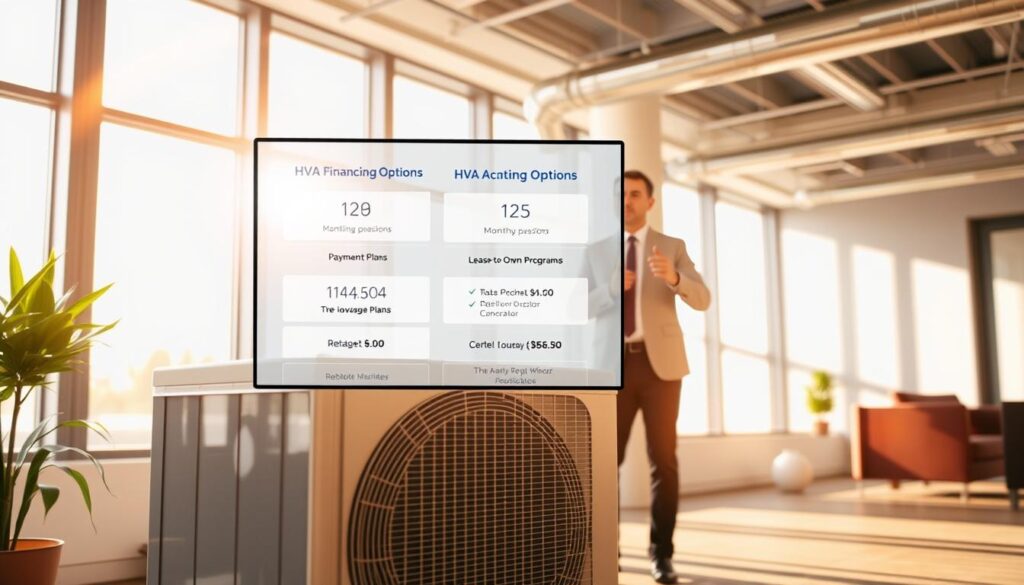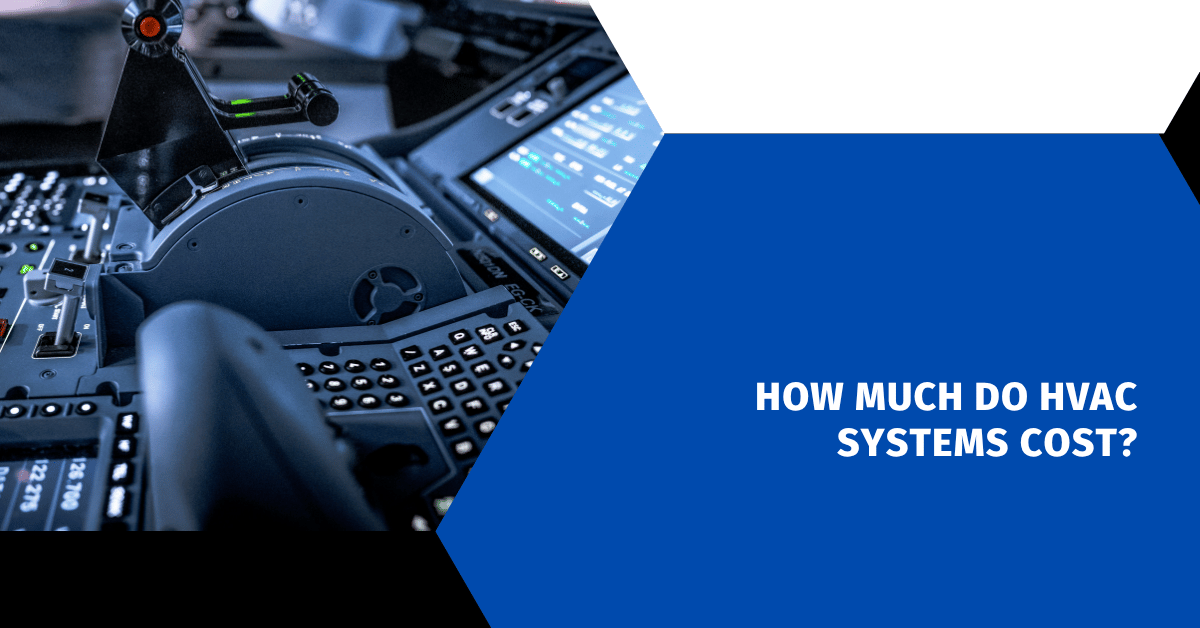Affiliate Disclosure
HVAC Guide Guys is a participant in the Amazon Services LLC Associates Program, an affiliate advertising program designed to provide a means for sites to earn advertising fees by advertising and linking to Amazon.
How Much Do HVAC Systems Cost? Are you curious about the cost of an HVAC system? Figuring out the cost can seem like a puzzle. The average price for HVAC systems is between $5,000 and $12,500. Most people pay around $7,500 for a full system upgrade.

Your home’s comfort and energy use depend on the right HVAC system. The cost isn’t just the initial price. It’s an investment in your home’s comfort, air quality, and saving energy in the long run. Things like your home’s size, the type of system, and its efficiency can change the total cost a lot.
Choosing the right HVAC system is important. You need to think about your needs, budget, and home’s features. Every home is different, and so is the best HVAC system for it.
Key Takeaways
- Average HVAC system cost ranges from $5,000 to $12,500
- Total cost depends on home size and system complexity
- Consider long-term energy efficiency when budgeting
- Professional installation is key for the best performance
- Many factors affect the final cost of an HVAC system
Table of Contents
Understanding HVAC System Basics and Average Costs
Understanding HVAC systems is key to making smart choices about cost. These systems keep your home comfortable, no matter the weather outside.
HVAC systems do more than just control temperature. They also handle humidity, air circulation, and filtration. This ensures your indoor air is clean and healthy.
What Defines an HVAC System
HVAC systems have many parts that work together. They are not just for heating and cooling. They manage your home’s environment in a complete way.
National Average Cost Ranges
HVAC system prices vary a lot. Here’s a look at what you might pay:
| System Type | Average Cost Range | Typical Lifespan |
|---|---|---|
| Central Air Conditioning | $3,000 – $7,000 | 10-15 years |
| Heat Pump System | $4,000 – $8,000 | 12-15 years |
| Ductless Mini-Split | $2,000 – $5,000 | 10-15 years |
Installation vs Equipment Costs
When planning for an HVAC system, remember there are two main costs. The price of the equipment and the cost of installation. The equipment usually makes up 40% to 60% of the total cost. Installation costs the rest.
What you pay will depend on your home’s size, ductwork, and local labor rates. Always talk to HVAC experts for a precise estimate for your home.
Explore Our HVAC Shop
Looking for top-rated HVAC tools, parts, and accessories? Visit our shop and find the perfect solution for your needs.
Visit the ShopHow Much Do HVAC Systems Cost by Type
When looking at residential hvac costs, it’s key to know the price differences between system types. The cost of HVAC systems can change a lot, depending on the equipment you pick.
Air conditioning systems have a wide range of prices:
- Central Air Conditioning: $3,000 – $7,000
- Ductless Mini-Split Systems: $1,300 – $8,500
- Window Units: $150 – $750
Furnace prices vary a lot, based on the fuel type:
- Electric Furnaces: $1,000 – $2,500
- Gas Furnaces: $2,500 – $6,000
- Oil Furnaces: $4,500 – $9,000
Heat pumps offer flexible solutions with different prices:
- Air-Source Heat Pumps: $4,000 – $7,000
- Geothermal Heat Pumps: $10,000 – $25,000
- Mini-Split Heat Pumps: $1,300 – $8,500
“Your specific home requirements will ultimately determine the most cost-effective HVAC solution.”
Choosing the right HVAC system means weighing the initial cost against long-term energy savings and performance. It’s wise to talk to a professional. They can help figure out what’s best for your home.
Factors Affecting HVAC Installation Prices
Understanding what affects hvac installation cost is key to smart choices for your heating and cooling. Many factors influence the total cost of your HVAC system.
Your home’s unique features greatly impact hvac costs. Different elements can change the final cost a lot.
Home Size and Layout Considerations
The size of your home affects your HVAC needs. Bigger homes need more powerful, expensive systems for good heating and cooling. Important things to think about include:
- Total square footage of living space
- Number of floors and rooms
- Ceiling height and room configurations
- Insulation quality
Ductwork Requirements
Ductwork is your HVAC system’s circulatory system. Proper duct design can significantly impact overall hvac installation cost. Things to look at include:
- Existing duct condition
- Necessary duct modifications
- Sealing and insulation requirements
- Potential duct replacement
Energy Efficiency Ratings
Energy efficiency is key in hvac costs and system choice. Higher efficiency means:
- Lower long-term energy costs
- Potential tax credits and rebates
- Less environmental impact
- Better system performance
Choosing a high-efficiency HVAC system can save a lot over time.
By thinking about these factors, you can make a better choice for your HVAC installation. This balances the initial cost with long-term savings.
Explore Our HVAC Shop
Looking for top-rated HVAC tools, parts, and accessories? Visit our shop and find the perfect solution for your needs.
Visit the ShopHVAC Equipment Brands and Their Price Points
Looking into hvac equipment prices? Knowing the top brands is key. Each brand has its own strengths that affect prices and performance.
There are many HVAC brands for homes and businesses. Your choice affects both the cost upfront and how well the system works over time.
- Carrier: Known for reliability and advanced technology
- Trane: Offers high-performance systems with robust warranties
- Lennox: Specializes in energy-efficient equipment
- Rheem: Provides budget-friendly solutions
- Mitsubishi: Leaders in ductless and mini-split systems
Prices for these brands vary a lot. A basic Rheem unit starts at $3,000. But, a top Carrier system can cost over $10,000. The size of your home and the system’s complexity also matter.
“Investing in a quality HVAC brand can save you money in the long run through improved energy efficiency and reduced maintenance costs.” – HVAC Industry Expert
When looking at hvac prices, think about more than just the cost. Energy-efficient models can save you money over time. Each brand has special features that might fit your needs and budget better.
Labor Costs and Installation Expenses
When planning your HVAC system installation, it’s key to understand labor costs. Professional installation includes many parts that affect your total cost. These costs are more than just buying equipment and need careful thought.
Your total cost will depend on several important factors. Professional contractors will look at these during the installation.
Permit and Inspection Fees
Local governments need specific permits for HVAC installations. These permits cost between $250–$400, based on your area’s rules. Important things to consider are:
- Getting the right city or county permits
- Scheduling professional inspections
- Following local building codes
Installation Timeline Considerations
The time it takes to install your HVAC affects labor costs. Most homes take 1-3 days to install, but complex systems might need more time. Things that can change installation time are:
- Home size
- Ductwork condition
- System complexity
- Number of zones
Additional Installation Requirements
Professional HVAC contractors sometimes face unexpected issues. These can raise labor costs, like needing structural changes or electrical upgrades.
Choosing professional installation means your system will work well and last longer.
Explore Our HVAC Shop
Looking for top-rated HVAC tools, parts, and accessories? Visit our shop and find the perfect solution for your needs.
Visit the ShopAdditional Components and Their Costs
Homeowners have many options to improve their HVAC system’s performance and comfort. These upgrades can affect your hvac system prices and how well you control your home’s climate.

Looking into optional upgrades can greatly improve your home’s air quality and energy use. Here are some key components to think about:
- Smart Thermostats: These devices help control your home’s temperature more efficiently.
- Air Purification Systems: They use advanced filters to remove allergens and pollutants from the air.
- Dehumidifiers: These systems help reduce moisture and make your indoor air more comfortable.
- Zoning Systems: They allow you to set different temperatures in different areas of your home.
The cost of these upgrades varies based on their features and complexity. Here’s a breakdown of what you might expect to pay:
| Component | Average Cost Range | Installation Complexity |
|---|---|---|
| Smart Thermostat | $200 – $500 | Low |
| Air Purifier | $400 – $1,500 | Medium |
| Whole-Home Dehumidifier | $700 – $1,300 | Medium-High |
| Zoning System | $1,500 – $3,000 | High |
Before choosing any upgrades, talk to an HVAC expert. They can help you pick the best options for your home and budget.
Energy Efficiency and Long-term Cost Savings
Getting an energy-efficient HVAC system can cut down your costs over time. Knowing how efficiency saves money helps homeowners choose wisely for their heating and cooling.
Today’s HVAC systems help save on maintenance costs and keep your home comfy. Choosing the right one means understanding efficiency and long-term savings.
SEER Ratings Explained
Seasonal Energy Efficiency Ratio (SEER) ratings show how well an air conditioner cools. Higher SEER ratings mean:
- Less energy use
- Lower bills
- Less harm to the environment
Annual Energy Cost Calculations
To figure out energy savings, compare SEER ratings. A 16 SEER system can cut cooling costs by up to 30% compared to older models.
Return on Investment Timeline
Even though efficient HVACs cost more at first, they usually pay off quickly. They offer:
- Quick savings on energy bills
- Higher home value
- Less carbon footprint
Tip: Most energy-efficient systems pay back extra cost in 5-7 years through lower bills.
Explore Our HVAC Shop
Looking for top-rated HVAC tools, parts, and accessories? Visit our shop and find the perfect solution for your needs.
Visit the ShopHVAC Financing Options and Payment Plans

Dealing with a big hvac replacement cost can feel overwhelming. But, there are many financing options to help. They make managing your hvac installation cost easier.
Looking into financing strategies can change how you see your HVAC investment. It can go from a big expense to something you can handle. Here are some main options to think about:
- Personal Loans: Quick approval and flexible terms
- Home Equity Loans: Lower interest rates
- Manufacturer Financing Programs: Special promotional offers
- Credit Card Financing: Short-term solution for smaller projects
Choosing the right financing depends on a few key things:
| Financing Option | Interest Rate | Approval Speed | Loan Amount |
|---|---|---|---|
| Personal Loans | 6-36% | Fast | $1,000-$50,000 |
| Home Equity Loans | 3-11% | Moderate | $10,000-$250,000 |
| Manufacturer Programs | 0-7% | Quick | System-specific |
Pro tip: Always compare different financing options. Make sure to understand the total cost, including interest rates and fees, before you decide.
Some HVAC makers have special financing deals with zero-interest offers. These can lower your upfront hvac replacement cost a lot. Ask local contractors about these deals.
Conclusion
Knowing how much HVAC systems cost is key for homeowners planning big home upgrades. Your HVAC system is a big deal for comfort and saving energy. By looking at your home’s needs, you can choose wisely, balancing cost and performance.
The cost of an HVAC system isn’t just the price tag. You also need to think about installation costs, ductwork changes, and maintenance. Getting it installed right and keeping it up can save you money and headaches down the road.
Energy efficiency is a big part of your investment. Modern HVAC systems with high SEER ratings can cut your energy bills a lot. Even though they cost more upfront, the savings over time make up for it. Picking the right system for your home’s size and climate ensures comfort and savings.
When you’re ready to buy an HVAC system, do your homework. Look at different brands, get detailed quotes, and check out financing options. Your aim is to find a system that fits your budget and keeps your home comfortable for years.

